B2B marketing is a high-stakes game.
Get it right and you can scale your company exponentially. Miss the mark and you'll have a bored and hungry sales team breathing down your neck.
But just because it's a high-stakes game doesn't mean that it's a gamble.
If you know your customers inside and out, your strategy is well developed, and you choose the right tactics and marketing channels for B2B, you can cash in big time.
Have you got the guts to cut it in the world of B2B marketing?
What Is B2B Marketing?
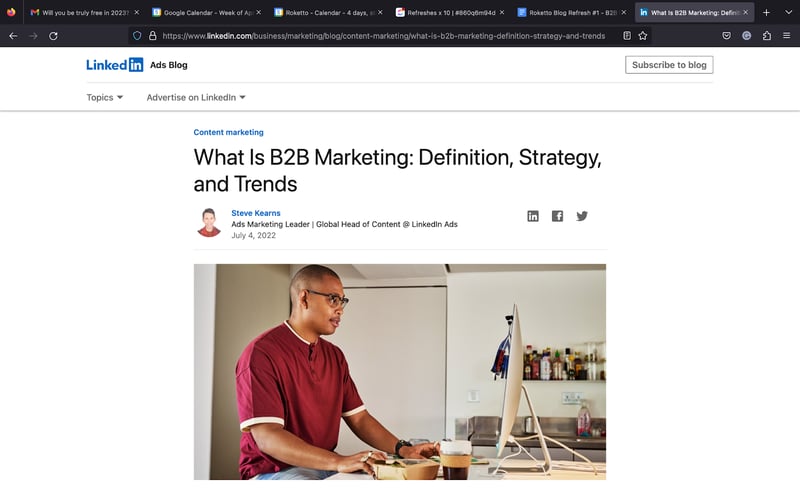
It's kind of in the name, really. But let's get into the definition of B2B marketing anyway.
B2B marketing is a form of marketing practiced by marketers in business-to-business companies. B2B companies are those that sell a product or service to another business, as opposed to directly to the consumer.
B2B companies may provide a product or service to help their customers succeed, such a B2B SaaS marketing platforms or security services, or they may also be selling a product that is required for the customer to be able to operate their business, such as timber supplies.
As a B2B marketer, you need to understand just how different your customers are from regular consumers, particularly if you are looking to predictably grow your B2B SaaS company.
B2C vs B2B Marketing - What's the Difference?
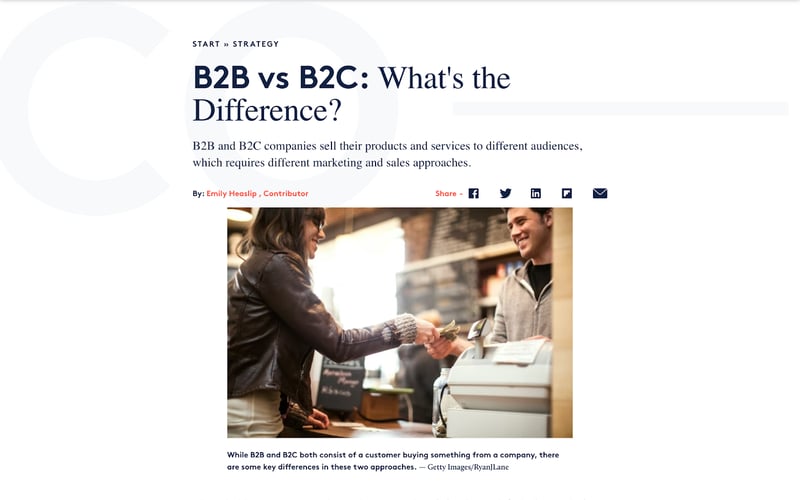
The major difference between B2B vs B2C marketing strategies and activities is the intended audience. Defining and understanding your audience is the key to any successful marketing strategy, but it is especially crucial when marketing in the B2B space.
Our article on how to create an effective B2B content marketing strategy has insights into developing the best plan for your organization. Check it out if you want to build credibility and provide your audience with the content they want to read at the time that fits their agenda.
There are three major differences between business and consumer purchases:
- Goals
- Buying motivation
- Purchase process
Let's dive into each one for a better understanding of these nuances.
Goals

When consumers are considering a purchase, their goal is generally to satisfy a personal need or, more likely, a want. These decisions are, for the most part, made out of desire ("I really want this new blue widget."), or fear ("What will happen to me if I don't buy this blue widget?").
The goal of business decisions, however, is generally less emotionally-focused.
| B2C Buying Goals | B2B Buying Goals |
|---|---|
| Seeking fun or entertainment | Seeking efficiency, expertise, and return on investment |
| Looking to make a personal impact in their life | Looking to increase revenue or reduce costs |
Buying Motivation
 In sales and marketing theory, buyer motivation is typically considered to be based on one of two things: emotion or logic.
In sales and marketing theory, buyer motivation is typically considered to be based on one of two things: emotion or logic.
| B2C Buying Motivation | B2B Buying Motivation |
|---|---|
| Emotional decision making | Logical decision making |
B2C buyers tend to be more emotionally motivated, with B2B purchasers typically making a more logic-based decision.
This, of course, is a generalization, in many cases, consumers will take into account logical reasons for their purchases, and business buyers will indeed be emotionally motivated by the impact your product or service will have on their company. However, as a general rule, you should consider B2B buyers largely logical decision-makers.
Purchase Process
 The final way in which B2B customers differ from consumers is in the way they go about making a purchase. There are several key differences between the purchase processes of B2B and B2C customers:
The final way in which B2B customers differ from consumers is in the way they go about making a purchase. There are several key differences between the purchase processes of B2B and B2C customers:
| B2C Purchase Process | B2B Purchase Process |
|---|---|
| Customers like to be educated, but it isn’t required for a purchase | Buyers want to be educated by you - it demonstrates your expertise and builds trust |
| Customers generally like to make purchases directly, even avoided personal interaction altogether by purchasing online | Buyers typically prefer to work with a salesperson or account manager |
| Customers are often able to make a purchase decision on their own | Buyers generally need to consult with other team members or decision makers before purchase |
| Customers are not always looking for a long-term relationship with the company | Buyers typically prefer long term solutions |
A great takeaway from this is that B2B purchasers still rely significantly on the input of the company they are buying from, seeking educational content and preferring to work with an account manager or salesperson.
By contrast, the consumer decision-making process has changed significantly in recent years, putting more power in the hands of the buyer and making it, in some ways, more difficult for B2C marketers to influence a purchase.
Marketing Plan for B2B

The foundation of any successful marketing strategy is first understanding your customers and, secondly, dedicating a significant chunk of time to planning, strategizing, and organizing.
"If you fail to plan, you are planning to fail" - Benjamin Franklin
Yes, it's a huge cliche. But it's a cliche for a reason.
Before you even think about publishing a blog or running a social media campaign, take a step back and get these five areas nailed down:
- B2B Marketing Goals
- Customer Personas
- Tactics and Channels
- Creation and Distribution of Assets
- Measures and Metrics
B2B Marketing Goals
You don't jump in the car with no idea where you're heading, so why would you do the same with your B2B marketing campaigns?
Defining your high-level goals at the outset is crucial to determining the effectiveness of your campaigns too. If you don't have a reference point for success, how do you know when you've made it?
Chances are, your B2B marketing goals will include a few of the following:
- Brand awareness
- Generate leads
- Thought leadership
- Lead conversion
- Customer engagement
- Recruitment
- Brand loyalty
- Traffic
- Nurture leads
It's important not to go overboard with the goals. Sure, all of the above are desirable, but that doesn't necessarily mean they are relevant to you and your company. Try to focus on 2 or 3 primary goals, with maybe a couple of secondary goals as consideration.
In order to properly define and measure the success of any of your marketing campaigns, you should go a step further than simply saying, "We want to increase lead generation." How are you going to measure when you've hit that goal?
Does just one more lead than last year count as an increase? Chances are you probably wouldn't be happy with that outcome. So, set some clear, measurable goals from the outset.
"Generate more leads" becomes "Improve monthly lead generation by 25%". "Improve brand loyalty" might be developed further into the goal "Reduce customer churn by 15%".
Customer Personas
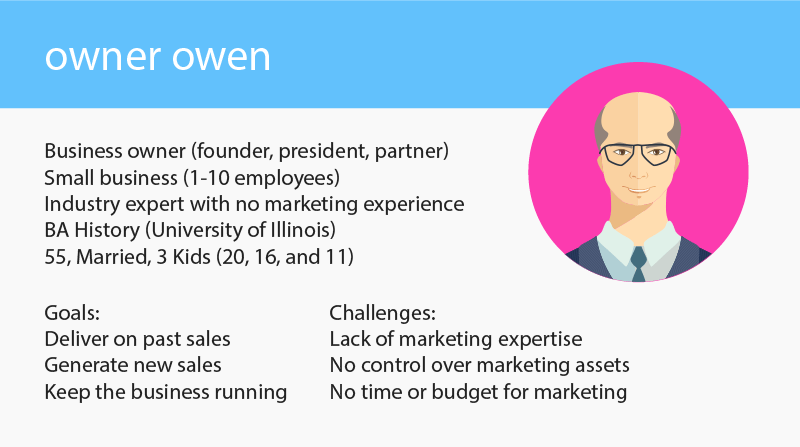
We said it before, and we'll say it again: the foundation of any successful marketing strategy is first understanding your customers.
Ask yourself these three questions:
- Do we know what our customers really want from us?
- Can we define our customers by demographic, occupation, and challenges?
- Do we know what makes our customers buy from us?
If the answer to any of these questions is no, maybe, or anything short of a resounding YES, then you need to develop some customer personas.
A buyer persona is a generalized representation of your company's customers - both current and potential.
If you don't have a clear understanding of your audience, then you won't understand your customers' challenges and needs, you won't properly comprehend your customers' buy cycle, you won't produce meaningful content, and you'll possibly even choose the wrong marketing channels.
So how do you go about creating a buyer persona?
Start by collecting and analyzing data you have on all of your current clients. Most customer personas focus on these five areas:
|
Company profile |
|
|
Occupation |
|
|
Personal interests and information |
|
|
Goals |
|
|
Challenges |
|
This is why creating customer personas is so critical. Once you know exactly who your customers are, you have a pretty good idea of what channels are going to work best. That said, you might need to go through a bit of trial and error, or run a few A/B tests, to determine the ultimate channel(s) for your B2B marketing efforts.
There are, however, a few universal rules. We'll discuss these in greater detail soon, but for now, file these tips in the section of your brain marked "Top Secret Awesome B2B Marketing Ideas".
- If you're in B2B, chances are LinkedIn should be part of your social media strategy
- SEO is always worth focussing on
- If you're not creating content, you won't be closing clients
Creating Assets
You know what you're trying to achieve, you know just who you're targeting, and you know the channels you're going to use to get to them. Now it's time to create some assets.
Your marketing assets are things like:
- Blog posts
- Whitepapers
- Images
- Videos
- Brochures
- Logos
The easiest way to do this is by creating a spreadsheet that lists all of your assets by type, title, purpose, location, and effectiveness.

Now that you know what you already own, you can perform a gap analysis. This is the process of comparing your database of owned assets with your marketing plan to determine what types of assets need to be created.
Naturally, you need to have created that plan first:
- Determine the key marketing messages you want to communicate
- Decide how these messages can be conveyed via different assets
- Align your messages and assets with the customer buying cycle
- Create a planner which outlines what assets need to be created
Once you have a plan for asset creation, compare this with your asset audit spreadsheet. Chances are, you'll find certain marketing assets that can be repurposed to fit the new plan. This is a great way to keep costs down in a B2B marketing strategy.
Make sure that you create a plan for the assets that still need creating, which includes when they are due, and who is responsible for producing them.
Measures and Metrics
Setting goals, even specific numeric ones, are very different from measuring and tracking metrics. Of course, these two concepts are inextricably linked.
Your metrics help you determine whether you're on track for your goals. Exactly what you track and measure will ultimately depend on your own goals and strategy, but here are a few common B2B marketing metrics:
- CVR - Conversion Rate (% of leads that become customers)
- Traffic - no. of unique website visitors
- Engagement - likes, comments, shares, new followers
- Email - Open Rate, Reply Rate
- CTR - Click Through Rate (% of ad viewers that click through to your site or landing page)
- Lead Channel Origination (tracks which channels your leads are coming from)
- CAC - Customer Acquisition Cost (sales and marketing costs divided by the number of new customers give you an average cost of acquiring one new customer)
- Bounce Rate (% of people that landed on your site, took no action, and left soon after)
Bounce rate is a great metric to understand whether or not your landing pages are effective. Unbounce is a fantastic conversion optimization tool that focuses on just that.
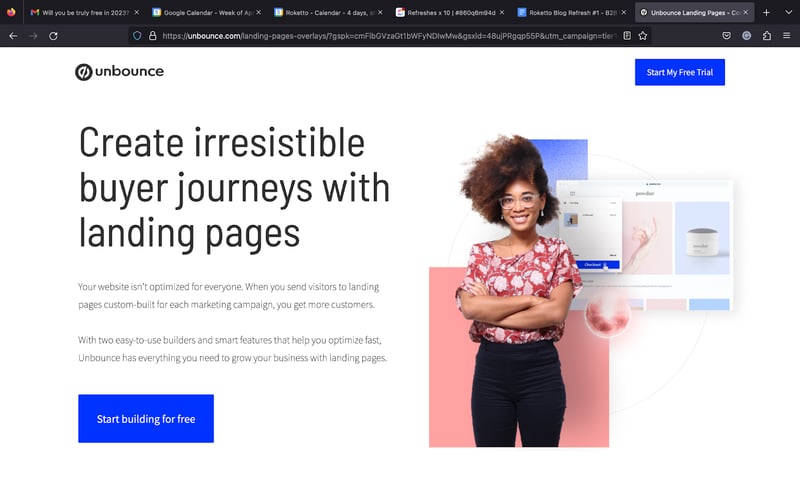
You should be tracking, reporting on, and analyzing metrics onat leasta monthly basis. Not only does this allow you to reflect on what's been working well (and what isn't), but it gives you indicators as to potential changes you can make in the coming months.
Even if your B2B marketing strategy seems foolproof at the beginning, chances are you'll need to make some adjustments as you go. Regardless of whether you're creating a B2B, B2C, or SaaS marketing plan, you should expect to make some changes. Tracking and reviewing your metrics regularly helps you make these decisions.
Marketing Channels for B2B

As already mentioned, the specific marketing tactics and channels you'll use will be dependent on your company and its strategy. However, there are some tactics that are just too valuable to ignore.
These are four of the most effective channels to use in your B2B marketing strategy.
Content Marketing in B2B

Content marketing is the favourite child of B2B marketers right now. The reason why: it's super effective.
It's effective for building an audience, it's effective for building trust, and it's effective for building and scaling your company. Plus, it's incredibly cost-effective. Okay, we'll stop being effective now.
So why is content marketing so...powerful? (Thanks, thesaurus.com)
Well, for starters, content marketing leaders see almost 8x as much unique traffic growth as their less content-savvy counterparts.
Not good enough? How about the fact that content marketing generate 3 times as many leadsas traditional marketing.
Plus, it costs 62% less. Seriously. It's why industrial content marketing is crucial for B2B industrial product and services companies.
Some of the most common content marketing forms include blogs, whitepapers, webinars, guides, case studies, infographics, and eBooks. Not all of them will be suitable for your intended audience, so start with what you think might work best based on your customer personas and adjust from there as required.
If you're searching for inspiration, why not look at some B2B content marketing examples to see what is possible in business-to-business selling?
It can be difficult to come up with new content ideas on a monthly basis, so dedicate some time during the planning phase to the content plan for 6-12 months. Still stuck for ideas? BuzzSumo can help you come up with new content topics. Before you know it, you'll be putting together a B2B content marketing strategy that attracts the customers you want.
Email Marketing in B2B

You'd think, given almost 300 billion emailsare sent each day that email marketing would be a lost cause. Though it is easy to get lost in the noise, B2B marketing emails are still a solid strategy with an expected ROI of more than $40 per $1 spent.
The trick is to provide incredible value. It's not enough to simply send out a template email each week and consider the task done. You need to be providing actionable insights, you need to create killer headlines, and you need to be sending the right stuff to the right people.
As your email list grows, you should consider segmenting subscribers into separate lists and writing more targeted messaging. This will greatly improve your email open and click-through rates, as well as lead conversion metrics.
You should also stop using complex spreadsheets and get your email list into an email marketing automation client such as Mailchimp.
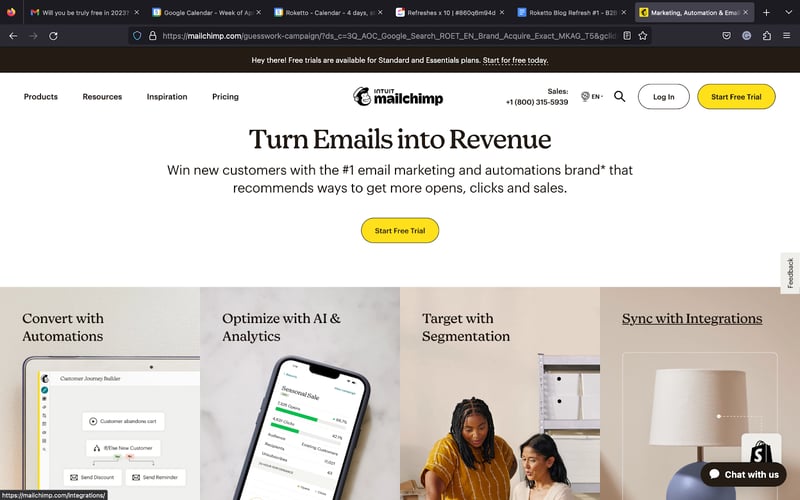
Digital Marketing in B2B

Online advertising has many nuances that amalgamate to form part of your outreach efforts. A focus should be placed on each approach to benefit the most from these digital marketing for B2B endeavours.
Here we look at the individual areas of B2B digital marketing that make the most significant impact.
B2B Marketing on Social Media
Often considered the domain of B2C marketers, social media has a huge place in B2B marketing strategies.
The truth is that B2B buyers are people, and they have Facebook and Instagram accounts just like everybody else. You may want to be cautious when using these platforms, as they are typically personal accounts. Some prospects may not appreciate seeing business-related advertising during their private time.
If you are concerned about this, LinkedIn and Twitter might be your platforms of choice. Ultimately, it depends on your customer personas and your overall strategy.
Social media marketing is regularly used to share your content assets, especially blog posts. It would be best if you were sharing blog posts on all of your platforms but consider posting within groups or running some paid ads.
Grow your audience by running campaigns and competitions that involve liking, sharing, or following your page or account. Are you aiming to increase website traffic to convert viewers into leads there? Create a social media ad that entices prospects to click through and learn more.
Interested in capturing email addresses? Try a form-fill ad that offers a free eBook or guide in exchange for an email.
LinkedIn for B2B Marketing
With over 750 million users, LinkedIn has expeditiously become the go-to website for business. There are many other reasons if the sheer volume of industry experts and professionals in a single location doesn't convince you to target your marketing efforts on the platform.
For starters, B2B Marketing on LinkedIn allows you to utilize precise targeting to find the leads that fit your buyer persona. Users have virtually limitless options regarding LinkedIn targeting strategies and choices.
You must remember that LinkedIn for B2B marketing is all about context. Having the ability to choose who to advertise to, such as directors, owners, partners, business managers, or CEOs, means you're targeting decision-makers and top-level executives.
Another great feature of B2B marketing on LinkedIn is that you can match your data with prospects. Upload a list of 300 or more emails and successfully match with each profile to gain access to the Matched Audience feature, which can be added to any LinkedIn campaign.
With the myriad benefits of LinkedIn B2B marketing, it would be silly not to check it out!
Google Ads for B2B
Search marketing, search engine marketing, or simply search refers to tactics that involve getting your company found when customers use a search engine such as Google.
This is typically seen as two separate tactics:
- Search Engine Optimization (SEO) - Organic
- Pay Per Click (PPC) - Paid
SEO involves optimizing the content on your website, blog, and landing pages to attract searchers. It also focuses on building links to your web pages in order to boost their authority.
PPC activities are, in a way, paying to cheat that system. Where SEO seeks to improve your position in the SERPs organically, PPC basically pays to jump the queue.
However, if implemented correctly, Google Ads can be an excellent way to get more leads into your sales pipeline.
In the Google search below, the first result is a result of PPC, signified by the word "Ad" in front. The second result is an authority post based on organic SEO.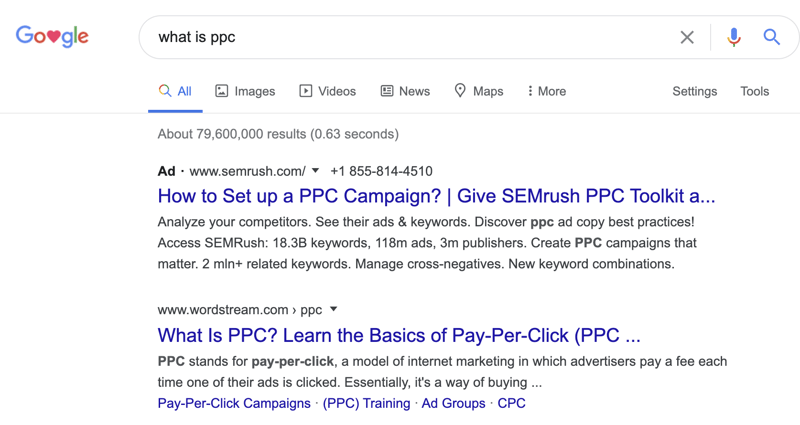
3 B2B Marketing Strategies
Marketing a B2B business can be daunting, but incorporating innovative strategies can make your efforts more impactful and exciting. Let's look at three effective B2B marketing strategies that can capture the prospect's attention, convert them into paying customers, and retain them for their lifetime value.
Niche Driven Strategy
Specialization and niche targeting have to be two of the most critical business considerations. Companies that are experts in carefully targeted niches tend to be the fastest growing.
Becoming the undeniable expert and leader in the area or industry is the goal of a niche-driven strategy.
Defining exactly what you do and how it's different from the competition means your marketing efforts are more effortless. Specialization can help a B2B sales organization stand out in a flooded marketplace.
Invest in Search Engine Optimization (SEO)
Besides having a high-quality website (which acts as your business's digital brochure or billboard,) investing in SEO is critical. A successful website contains everything about a company and showcases its expertise through an information-rich projection.
If the content on the site isn't optimized for SEO, you're missing out on crucial traffic. Though search engine optimization is an evolving and complex discipline, it comprises two key components.
- On-Site SEO: Google and other search engines need to know what your website is all about. With on-site SEO, targeted keywords and phrases are used to liaise specific topics or concepts that matter most to your audience.
- Off-Site SEO: Reaching out to other publications or websites through guest articles or outside engagement is perfect for boosting your off-site SEO rankings. You can become a widely recognized expert in your niche by including these efforts to increase your site's authority.
What are the results of both on-site and off-site SEO? Your website becomes more credible, and other relevant or high-authority sites will begin linking to your content - improving your position on the SERP.
Referral Marketing
Over 81.5%of B2B businesses have received a referral from someone who wasn't a customer. But who is advocating for these people? And why are they referring others to a company they have never dealt with?
It boils down to the organization's reputation for specific expertise.
Companies can build a solid reputation by utilizing content marketing in correlation with other approaches, such as advertising, social media marketing, audience research, lead nurturing, and customer relationship management.
New business and referral leads are the advantages of this newfound brand recognition.
If you still need to figure out how to get started, why not give our ultimate saas marketing plan blueprint a read?
2 Real-Life B2B Marketing Examples
Getting in front of the target audience means showing you know what's up. Check out these two real-world B2B marketing examples to stimulate those cranium juices and get ideas for future projects.
The Content Marketing Campaign
Providing valuable information helps companies establish themselves as thought leaders within an industry. Content marketing is the approach used in these B2B marketing efforts.
HubSpot is one successful example of how well a content marketing campaign can work. The organization's "Inbound Marketing and Sales Certification" offered customers free online sales and inbound marketing courses.
By offering valuable content to its clients, HubSpot demonstrates its expertise and builds trust and loyalty with tangible value.
The Social Media Campaign
Consider this approach if you're not using social media for your B2B marketing efforts. A great B2B marketing example that comes to mind is Mailchimp's "Did You Mean?" campaign.
The campaign used humour to engage with the target audience and beyond to promote the company's email marketing services. MailChimp's inspiration came from a podcast that began with its pre-roll audio ad.
One participant in the pre-roll accidentally misspelled the name to "MailKimp," which sparked laughs across the company's customers and target market.
Instead of cowering from the mistake, MailChimp embraced it and used it in a massive social media campaign. It inspired them to create nine fake brands, including short movies, hit singles, fashion, and sandwiches.
Here are the brands:
- MailShrimp
- FailChips
- MaleCrimp
- VeilHymn
- KaleLimp
- NailChamp
- WhaleSynth
- JailBlimp
- SnailPrimp
Now you can imagine this must have cost a ton of money - that is correct.
But it is part of the risk MailChimp was willing to take to get noticed.
The campaign featured a series of ads that playfully poked fun at common email mistakes, with the tagline "Did You Mean Mailchimp?" The campaign was highly successful, generating millions of impressions and increasing brand recognition and sign-ups.
Marketing KPIs B2B
Improving the bottom line requires that B2B marketers know which are the most critical KPIs. They help optimize the effectiveness of campaigns and move prospects through the funnel faster.
A key performance indicator is a metric such as a sales-qualified lead or conversion rate that aids in meeting your SMART goals and progress towards them. Various KPIs exist that assist business proprietors in measuring aspects of their goals and different processes.
Below are some common KPIs:
- Qualitative indicators: For example, customer feedback and employee satisfaction surveys.
- Lagging indicators: Measures the performance of a business or initiative, such as yearly net earnings.
- Quantitative indicators: Fact-based and numerical data, such as page views and customer acquisition, provide reliable, objective data.
These are only a few KPIs B2B marketing professionals work with daily.
However, choosing the correct KPIs for your B2B marketing objectives can keep you aligned with the business's goals, evaluate progress, and make more data-driven decisions.
Moreover, B2B marketing KPIs give quantitative evidence of excellent work to share with superiors, co-workers, or shareholders.
Marketing Trends B2B
The continuous evolution of the B2B space sees decision-makers use new mediums, such as podcasts, to learn about services, products, or solutions."Self-service" platforms are also gaining popularity, especially the ones with no contracts or flexible terms.
An interest in podcast marketing has grown 66% over the last five years - proving the above statement.
Here are three of the top B2B marketing trends in 2023:
- Video content: Webinars, Facebook Live, YouTube, LinkedIn, and explainer videos
- Machine learning and AI: B2B companies now utilize artificial intelligence technology to run their PPC or Google Ads campaigns. For instance, "Smart Bidding" is a feature available on Google Ads that automates managing a campaign.
- Storytelling: Marketing using storytelling has grown over 70 %in the last five years. Decision makers don't decide on products with absolute reasoning and logic-emotions play a significant role too. For example, SalesForce ran a campaign that humanized CRM customer benefits through storytelling.
Let's be honest; traditional digital marketing practices like ABM and email marketing are still as important as ever. However, with the constant development in the B2C vs B2B marketing and business space, performing outreach activities more relevant to your audience becomes crucial.
B2B Marketing Consulting
If you want to improve your B2B marketing strategy and achieve business goals, it may be a good idea to investigate B2B marketing consulting. The target audience of B2B marketing is other businesses rather than individual customers, as with B2C.
B2B marketing efforts can be unique, challenging, and opportunistic if you know how to do them-that's why many organizations seek the guidance and advice of a professional B2B marketing consultant.
These experts or service providers can encompass a broad range of activities, including:
- Sales enablement
- Advertising
- Content marketing
- Messaging and branding
- Customer segmentation
- Market research
B2B marketing consultants collaborate with businesses to understand their requirements and develop a customized plan that aligns with the organization's goals. Company owners can gain fresh insights and perspectives with the help of B2B marketing consulting services because of their wealth of expertise.
Having worked with multiple businesses across various industries, B2B marketing consultants help identify new opportunities for growth and areas where outreach efforts may be falling short.
B2B marketing consulting also helps companies navigate the rapidly evolving digital landscape. As digital technologies transform business interactions, companies must stay current on the latest trends and best practices. B2B marketing consultants provide guidance on topics such as social media marketing, search engine optimization, email marketing, and marketing automation, helping companies build a robust online presence and connect with customers in meaningful ways.
Hiring a B2B marketing consultant can be a valuable investment for a business looking to improve its marketing efforts and achieve objectives. By working with an experienced consultant like the ones at Roketto, an effective marketing strategy can be developed that meets your unique needs, reaches the target audience more effectively, and drives growth and profitability.
Conclusion
Planning and executing a successful B2B marketing strategy is no easy feat. Many start-ups fail here, but those that nail it? They win big time.
Nail your customer personas, choose your assets and channels wisely, and you're well on your way.
Can't quite get it right? Contactus to find out more.

Chris Onyett
Chris is one of the managing partners at Roketto. His area of expertise is digital marketing and loves sharing and educating on topics like Google Ads, CPC bidding tactics, Google Analytics, and marketing automation. When Chris isn't in the office, he enjoys playing volleyball, mountain biking, and hiking with his American Eskimo.














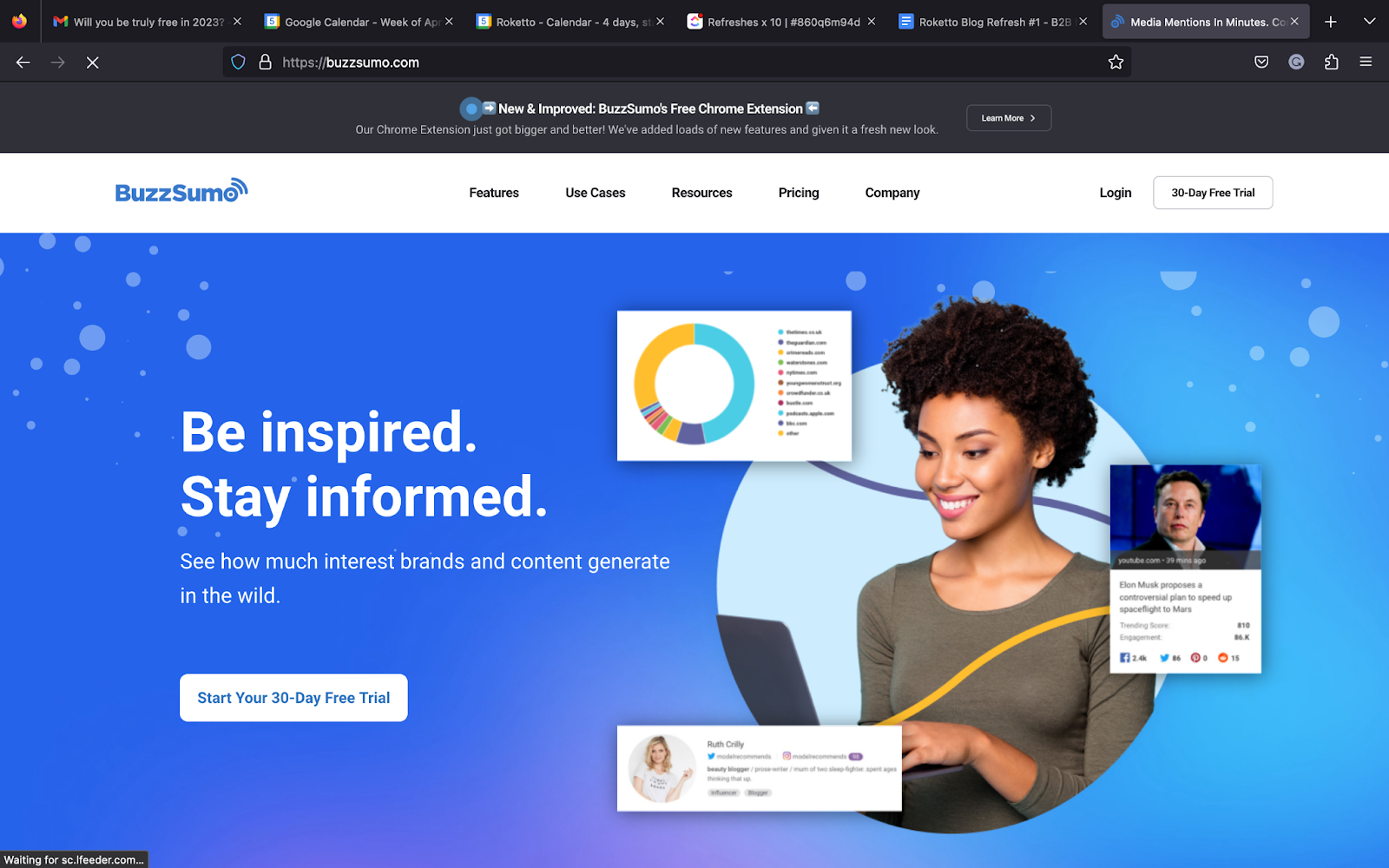


2.png)
2.png)




